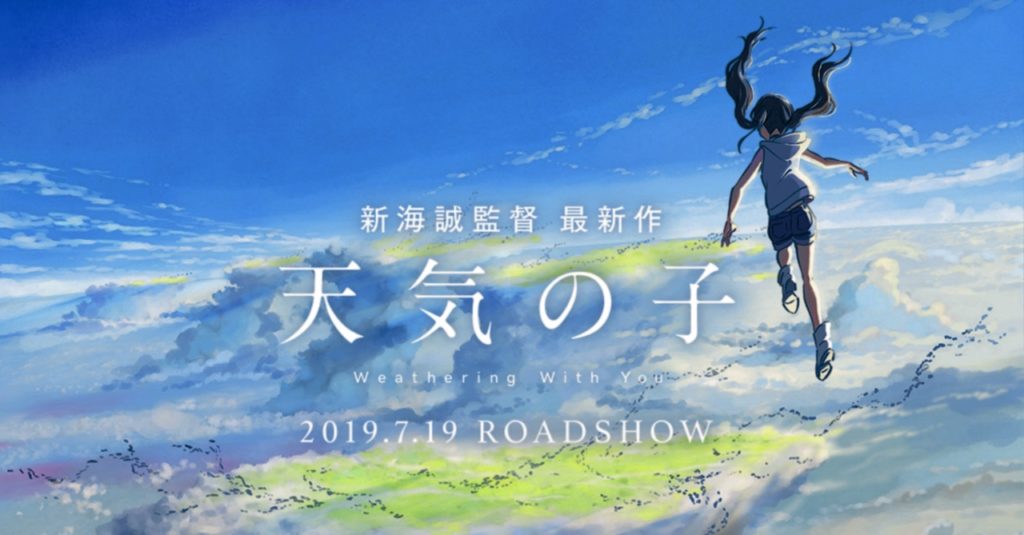Makoto Shinkai - Weathering with You
Yesterday, I’ve watched Weathering with You, the latest animation film by Makoto Shinkai. I must say, it certainly lived up to my expectations.

The film revolves around Hodaka, a high schooler who fled his remote island to work in Tokyo, and Hina, a girl who lives alone with her little brother. The story takes place in a parallel Japan where rain has been falling on the Kanto region for months on end. From the start, the movie shows you there’s going to be magic involved: Hina crosses the gate of a little shrine on top of an abandoned building and skyrockets above the clouds, greeted by “skyfish”. She is transported by the winds for a few scenes and suddenly regains consciousness under the gate, as if it were all a dream. It wasn’t though, otherwise there’d be no story, right?
I won’t tell more about the story itself but if you keep on reading there might be mild spoilers spawning here and there. The story is a quite predictable Japanese boy meets girl though, so you’re probably safe. As I’ve just said, the plot’s nothing crazy, but the execution is truly masterful. Gorgeous art, catchy music, good pacing, you name it, Shinkai does it with flying colors, and sometimes literally: a few scenes are absolutely breathtaking. Special mention to two of them: the scene where Hina takes Hodaka to the shrine and the fireworks scene. If that’s not called eye candy then I don’t know what is. Weathering with You definitely doesn’t lose in that regard against its predecessor, Your Name.
I love how Shinkai manages to tackle heavy topics while keeping the atmosphere quite light overall. Hodaka basically dropped high school and Hina’s mother died, leaving her and her brother behind. What’s more, Hodaka has to sleep outdoors a few nights to save money, and he has to avoid being controlled by police officers lest he be sent back home. As he’s kicked out of an entrance during a night, he finds a gun in the trash bin he tipped over. He freaks out but keeps it as a lucky charm, convincing himself that it must be fake. Do you know Chekhov’s gun? That’s literally it. Hodaka later tries to save Hina when he sees the young girl being dragged underground for shady business but is caught by one of the men, who pins him to the ground. Then, Hodaka tries to intimidate him with said gun; he pulls the trigger but (fortunately for both of them) misses the man’s cheek by an inch. Following that, both escape while the aggressor is too stunned to move. That scene will have heavy consequences on the story: first it causes both protagonists to meet and get involved with each other, and second it will eventually lead to Hodaka being tailed by the police. Distressed, Hodaka discards the gun after being shouted at by Hina and left alone. However, it will be relevant to the story a second time: that was a nice surprise I didn’t expect.
One of the strongest points of the movie has to be the moments of comic relief: Natsumi especially wins the award of the character who made me laugh the most, closely followed by Nagi and Kei. The “You were watching, weren’t you?” scenes were quite funny and the meeting with the diviner was downright hilarious. Also, I was pleasantly surprised by the appearances of Your Name’s characters Taki and Natsuho. Easter eggs in January? I’m in. Above all, the funniest scene has to be when Hodaka explains to the police officers that Hina disappeared becaused she sacrificed herself to restore the weather. One asks the other: “Should we send him to a psychiatrist?” I legit lost it: kids, take notes, that’s how things work in real life.
All in all, Weathering with You is a sparkling show which can revive the soul of the teen who lives—or once lived—in every one of us. The romance is somewhat cliché but is built well enough to make the most sensitive shed a tear, and the rest of the movie radiates with a vibrant energy which you can’t help but absorb a part of. It’s a rejuvenating elixir of feel-good scenes and (mildly cringy but nonetheless) engaging drama, sprayed with bits of philosophy, mythology and poetry, all of it intertwined in the rollercoaster of a grand emotional journey.
When you leave the theatre, there’s one good reason to feel disappointed, however: why does it always end just when both characters meet again? Between 5 centimeters per second, Your Name and this, it’s almost a Makoto Shinkai signature at this point. I’ll admit it: it’s satisfying enough, but am I the only one asking for a bit of fluff?
Don’t worry though, Shinkai-sensei. I’ll be impatiently waiting for your next movie.
